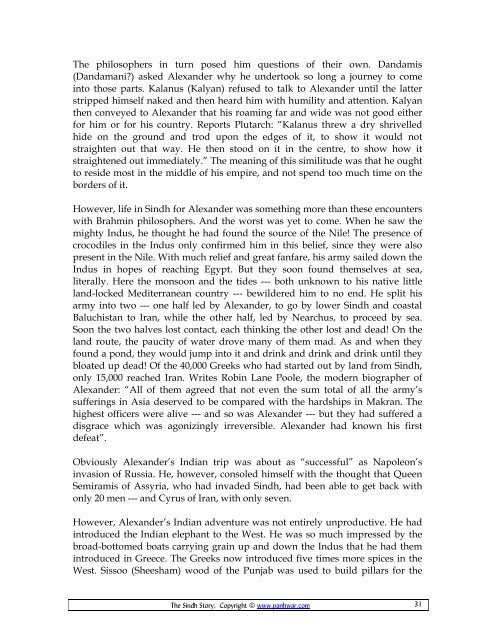You also want an ePaper? Increase the reach of your titles
YUMPU automatically turns print PDFs into web optimized ePapers that Google loves.
The philosophers in turn posed him questions of their own. Dandamis<br />
(Dandamani?) asked Alexander why he undertook so long a journey to come<br />
into those parts. Kalanus (Kalyan) refused to talk to Alexander until the latter<br />
stripped himself naked and then heard him with humility and attention. Kalyan<br />
then conveyed to Alexander that his roaming far and wide was not good either<br />
for him or for his country. Reports Plutarch: “Kalanus threw a dry shrivelled<br />
hide on the ground and trod upon the edges of it, to show it would not<br />
straighten out that way. He then stood on it in the centre, to show how it<br />
straightened out immediately.” The meaning of this similitude was that he ought<br />
to reside most in the middle of his empire, and not spend too much time on the<br />
borders of it.<br />
However, life in Sindh for Alexander was something more than these encounters<br />
with Brahmin philosophers. And the worst was yet to come. When he saw the<br />
mighty Indus, he thought he had found the source of the Nile! The presence of<br />
crocodiles in the Indus only confirmed him in this belief, since they were also<br />
present in the Nile. With much relief and great fanfare, his army sailed down the<br />
Indus in hopes of reaching Egypt. But they soon found themselves at sea,<br />
literally. Here the monsoon and the tides --- both unknown to his native little<br />
land-locked Mediterranean country --- bewildered him to no end. He split his<br />
army into two --- one half led by Alexander, to go by lower Sindh and coastal<br />
Baluchistan to Iran, while the other half, led by Nearchus, to proceed by sea.<br />
Soon the two halves lost contact, each thinking the other lost and dead! On the<br />
land route, the paucity of water drove many of them mad. As and when they<br />
found a pond, they would jump into it and drink and drink and drink until they<br />
bloated up dead! Of the 40,000 Greeks who had started out by land from Sindh,<br />
only 15,000 reached Iran. Writes Robin Lane Poole, the modern biographer of<br />
Alexander: “All of them agreed that not even the sum total of all the army’s<br />
sufferings in Asia deserved to be compared with the hardships in Makran. The<br />
highest officers were alive --- and so was Alexander --- but they had suffered a<br />
disgrace which was agonizingly irreversible. Alexander had known his first<br />
defeat”.<br />
Obviously Alexander’s Indian trip was about as “successful” as Napoleon’s<br />
invasion of Russia. He, however, consoled himself with the thought that Queen<br />
Semiramis of Assyria, who had invaded Sindh, had been able to get back with<br />
only 20 men --- and Cyrus of Iran, with only seven.<br />
However, Alexander’s Indian adventure was not entirely unproductive. He had<br />
introduced the Indian elephant to the West. He was so much impressed by the<br />
broad-bottomed boats carrying grain up and down the Indus that he had them<br />
introduced in Greece. The Greeks now introduced five times more spices in the<br />
West. Sissoo (Sheesham) wood of the Punjab was used to build pillars for the<br />
The Sindh Story; Copyright © www.panhwar.com<br />
31


